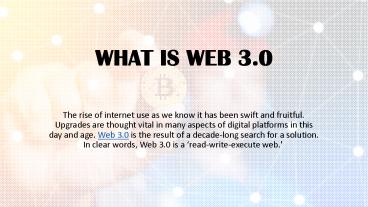WHAT IS WEB 3.0 - PowerPoint PPT Presentation
Title:
WHAT IS WEB 3.0
Description:
Web 3.0 is a more sophisticated beast. The ‘semantic web,' which analyses and uses user data and behaviour to create a more personalised web surfing experience, has emerged as a result of leveraging the power of big data and machine learning. This website is dedicated to providing knowledge on all things related to Web 3. Stay with us at dWeb Guide and grow with us - the future is here, and it's decentralised. – PowerPoint PPT presentation
Number of Views:5142
Title: WHAT IS WEB 3.0
1
WHAT IS WEB 3.0
- The rise of internet use as we know it has been
swift and fruitful. Upgrades are thought vital in
many aspects of digital platforms in this day and
age. Web 3.0 is the result of a decade-long
search for a solution. In clear words, Web 3.0 is
a read-write-execute web.'
2
- It is a solution in which data is shared rather
than owned in what is known as the "Web 3.0." Web
3.0 allows systems to search for, generate,
exchange, and connect material, and artificial
intelligence enables web pages to grasp the
meaning of words rather than just detecting
relevant keywords. - Web 3.0 encompasses a lot more. Web 3.0 is a new
age technology that is very appealing due to the
new and unique features that are calibrated
within the existing Web 2.0 ecosystem. Web 3.0
has the potential to drastically change how
people use the internet. With Web 3.0, automated
routine chores, scheduled reminders, AI-based
search, and other features will become
increasingly ubiquitous. - Users' digital experiences have been enhanced
significantly by Web 3.0, which also provides
security for web apps. The use of 3D graphics
opens up a world of options for how content might
be seen. Semantic metadata also facilitates
information connectivity, allowing everyone on
one common network to access all available
information based on user behaviour. This goes
beyond the concept of a simple website and builds
its own website.
3
- At dWebGuide Web 3.0 is the next step in the
evolution of the Internet. As a result, by
refusing to evolve with it, managers risk
exposing their organisations to the risk of
becoming outdated or irrelevant during
breakthroughs, similar to the giants of the past
such as Kodak, Nokia, and Altavista. However,
many experts predict that Web 3.0 would enable a
speedier, more intuitive web experience, allowing
users to forsake command-line search keywords in
favour of naturally speaking with Google. Show
me all the movies playing at my local theatre
tomorrow evening, is an excellent example of a
search query that will get the desired results in
the Web 3.0 era.
4
- Three reasons the rise of Web 3.0 will change our
lives for the better - 1. A more personalised browsing experience
- As distracting as those advertisements can be at
times, there's no denying the convenience of
being able to quickly click over to a unique
offer for something you actually need or desire
but might otherwise overlook. For all of us, Web
3.0 offers a considerably more personalised
surfing experience. Websites will be able to
adapt automatically to our device, location, and
any accessibility needs we may have, and web apps
will become significantly more aware of our usage
patterns. - 2. Better search
- As previously said, the capacity to converse with
a search engine in natural language is quite
powerful. Businesses will increasingly be able to
take a more natural approach to search engine
optimization on their websites, rather than
resorting to difficult keyword techniques, and
the benefits will extend far beyond the customer. - 3. Richer app experiences
- The diverse Web 3.0 will help more than just
websites web apps will begin to provide
significantly richer experiences for consumers.
Take, for example, Google Maps, which can now
combine basic location search with route
guidance, lodging recommendations, and real-time
traffic updates. In the Web 2.0 era, this was
just not achievable.

